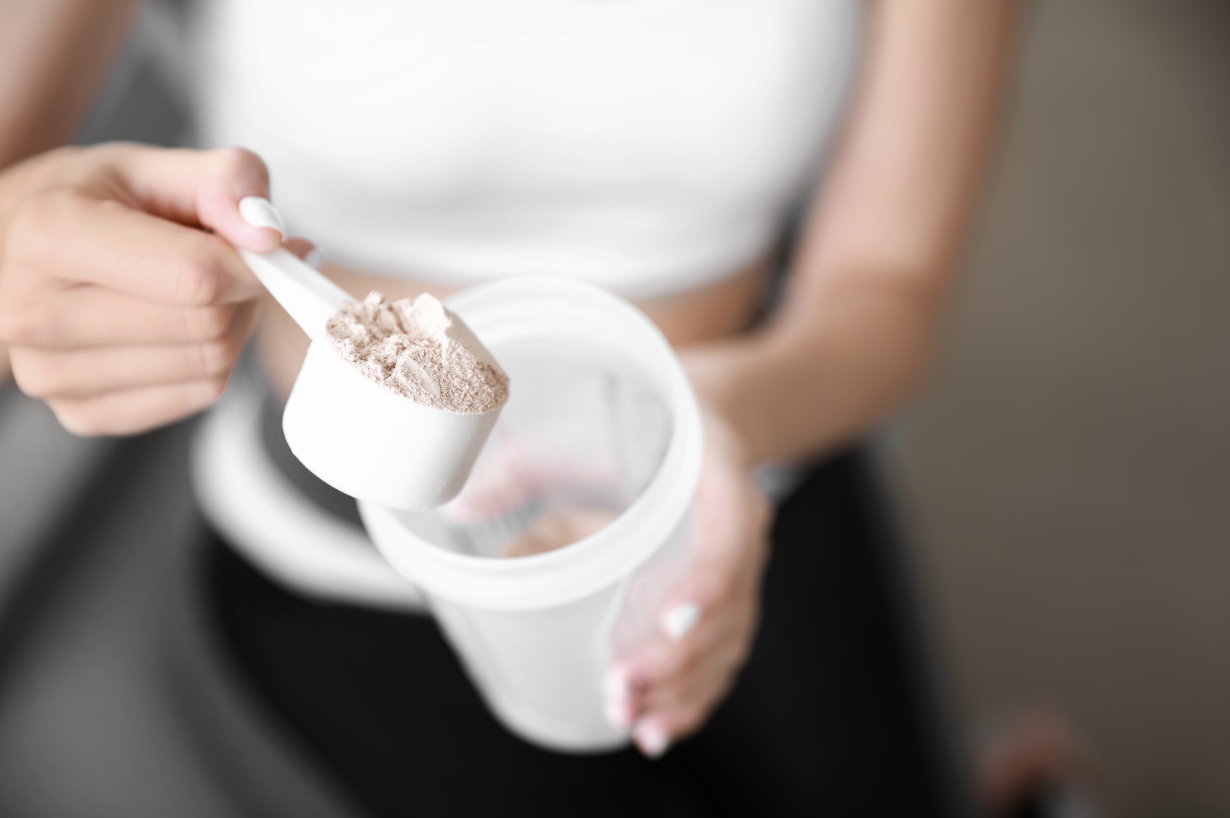
Pre-workout supplements are the secret sauce for many fitness enthusiasts, helping to elevate energy levels, focus, and overall performance.
But a question often gets overlooked: can pre-workout supplements contribute to weight gain?
While these supplements are generally low in calories, some ingredients like creatine can cause a minor uptick in water weight.
Let's dive into the details to understand how pre-workouts could affect your weight.
Pre-workout supplements are a staple for fitness enthusiasts aiming to elevate their game.
But there's a lingering question: can these supplements make you gain weight?
Generally, the answer leans towards no.
Most pre-workouts are low-calorie but can cause a minor 1-2% uptick in water weight if they contain creatine.

Pre-workouts are concoctions of various ingredients, each aimed at boosting a specific aspect of your workout.
From caffeine for that energy kick to creatine for enhanced muscle performance, these supplements are a cocktail for your gym routine.
Caffeine is the primary driver of performance in most pre-workouts.
The ingredient gives you that noticeable boost in energy and focus.
Research shows that caffeine can increase power output and endurance.
Creatine is another common ingredient, known for its role in improving strength and power.
While it doesn't offer immediate performance benefits, its long-term effects are noteworthy.
Studies indicate that creatine can lead to an 8% improvement in strength.
While pre-workout supplements do not directly cause significant weight gain, several factors could contribute to a few extra pounds on the scale.
Let's break down these factors into multiple subsections for a comprehensive understanding.
Most pre-workouts are low in calories, but reading the label carefully is essential.
Some brands may include added sugars or fats to improve the taste, which can contribute to your daily caloric intake.
Even a small amount of extra calories each day can increase over time, leading to weight gain.
Creatine is a common ingredient in many pre-workout formulas.
While it's excellent for boosting performance and muscle growth, it can also cause a slight increase in water weight.
This is because creatine pulls water into your muscle cells, increasing water retention.
However, this is usually a temporary change and not considered harmful.
Many pre-workouts contain stimulants like caffeine, which can have a complex relationship with weight.
On one hand, stimulants can boost metabolism and promote fat loss.
On the other hand, they can also suppress appetite in the short term, potentially leading to overeating later, contributing to weight gain.
The timing of your pre-workout can also play a role in weight gain.
If you take it close to meal times, you might skip meals or make poor food choices due to the appetite-suppressing effects of stimulants.
Over time, this can lead to weight gain due to poor nutrition and increased caloric intake.
Some research suggests that pre-workout ingredients, including insulin and cortisol, can affect hormone levels.
These hormonal changes can influence how your body stores fat and uses energy, potentially leading to weight gain.
Believe it or not, the mental aspect of taking a pre-workout can also contribute to weight gain.
Some people may feel that because they're using a supplement to boost their workout, they can eat more or skip sessions, leading to a caloric surplus and, eventually, weight gain.
By understanding these factors, you can make an informed decision about incorporating pre-workouts into your fitness routine without worrying about unwanted weight gain.

Caffeine is a staple ingredient in many pre-workout supplements, lauded for its ability to kickstart your energy and focus during exercise.
But what happens when the workout is over?
The long-term effects of caffeine on your metabolism and weight are a complex interplay of factors that go beyond the gym.
Caffeine can be a double-edged sword from its impact on blood sugar levels to its diuretic properties.
In this section, you'll learn the science behind caffeine's influence on your metabolism and weight, helping you make an informed decision about your pre-workout regimen.
Caffeine is a common ingredient in pre-workout supplements, known for its stimulatory effects that can boost your energy levels and improve your exercise performance.
However, its long-term effects on metabolism and weight are a subject of ongoing debate.
While caffeine can act as a thermogenic agent, helping you burn calories, it can also have less-than-desirable effects on your metabolism.
One of caffeine's lesser-known effects is its ability to influence blood sugar levels.
Research shows that caffeine can increase blood glucose levels, which can be detrimental to your metabolism in the long run.
Elevated blood sugar levels can lead to insulin resistance, a precursor to weight gain and metabolic disorders like diabetes.
Caffeine is also a diuretic, meaning it helps eliminate body water.
While this might seem like a quick way to lose weight, it's mostly water weight you're shedding, not fat.
And losing too much water can lead to dehydration, which can slow down your metabolism.
Your body can build up a tolerance to caffeine, meaning that over time, you'll need more of it to achieve the same effects.
This can lead to increased consumption, which not only puts you at risk for the negative metabolic effects mentioned above but can also lead to other health issues like high blood pressure and heart problems.
While caffeine can offer immediate benefits for exercise performance, its long-term effects on metabolism and weight are complex.
If you're using a pre-workout supplement with caffeine, it's crucial to be aware of these potential downsides and consider moderating your intake.
By understanding the long-term effects of caffeine, you can make more informed choices about your pre-workout supplements and how they fit into your overall fitness and weight management strategy.
When it comes to pre-workout supplements, it's not just the star ingredients like caffeine and creatine that you need to watch out for.
Hidden in the fine print of the ingredient list are other components like maltodextrin and artificial sweeteners, which can have a surprising impact on your weight and metabolism.
These seemingly innocuous ingredients can play a significant role in your fitness journey, for better or worse.
In this section, we'll dissect these lesser-known ingredients, shedding light on how they can affect your weight and what you can do to make smarter choices.

Maltodextrin is often used in pre-workout supplements as a quick source of energy.
However, it's a complex carbohydrate that can add extra calories to your diet.
While it may not seem like much, these calories can add up over time and contribute to weight gain.
Moreover, maltodextrin has a high glycemic index, which can lead to spikes in blood sugar levels and subsequent crashes, affecting your metabolism in the long run.
Artificial sweeteners like sucralose and aspartame are commonly used to sweeten pre-workout supplements without adding calories.
While they may seem like a good option for weight management, some research suggests that artificial sweeteners can contribute to weight gain by affecting gut bacteria and triggering cravings for sugary foods.
Many pre-workout supplements contain fillers and additives that serve no functional purpose but bulk up the product.
These ingredients include silicon dioxide and magnesium stearate, which, while considered safe, can add unnecessary substances to your diet.
While pre-workout supplements are designed to enhance your performance, it's crucial to be aware of their other ingredients.
Some of these, like maltodextrin and artificial sweeteners, can have subtle yet significant effects on weight and metabolism.
Always read the label carefully and consider how these ingredients fit your overall dietary and fitness goals.
By understanding the full scope of ingredients in your pre-workout supplement, you can make more informed choices that align with your weight management and fitness objectives.
While pre-workouts are generally safe, they can have side effects, particularly if they contain high stimulants like caffeine.
It's crucial to adhere to the recommended dosages, especially when it comes to stimulants.
Overdosing can lead to jitteriness, insomnia, and even heart palpitations.
Pre-workouts are for anyone looking to amplify their workout performance.
However, it's best to consult a healthcare provider if you have medical conditions or are sensitive to stimulants.
You can find pre-workouts at Walmart, Amazon, and eBay, but these platforms often don't offer the best deals or the most potent formulas.
We recommend specialized online retailers based in the States that offer worldwide shipping.

Does pre-workout make you gain fat?
No, pre-workout supplements are generally not designed to make you gain fat. They are low in calories and primarily aimed at boosting your energy and performance during workouts.
Can I lose weight while taking pre-workout?
Yes, many people use pre-workout supplements to enhance their exercise performance, which can contribute to weight loss when combined with a proper diet and exercise regimen.
Is it safe to use pre-workout daily?
Daily use is not recommended, especially for pre-workouts high in stimulants, as it can lead to tolerance and potential health risks.
Can I mix pre-workout with other supplements?
Yes, but caution is advised. Mixing stimulant-based pre-workouts with other stimulant supplements can lead to overstimulation.
Does pre-workout expire?
Yes, pre-workouts do expire. Using an expired product can be ineffective or even harmful.
How long before a workout should I take pre-workout?
Taking pre-workout supplements 20-30 minutes before your workout is generally recommended for optimal effects.
Can pre-workout cause dehydration?
Some pre-workout ingredients, like caffeine, can have a diuretic effect, potentially leading to dehydration. It's essential to stay hydrated when using these supplements.
Is pre-workout suitable for cardio workouts?
Yes, pre-workouts can benefit cardio workouts by increasing energy levels and endurance.
Can I take pre-workout on an empty stomach?
It depends on your tolerance and how your body reacts to the ingredients. Some people find that pre-workout on an empty stomach leads to quicker absorption, while others may experience stomach discomfort.
Are there any age restrictions for taking pre-workout?
Pre-workout supplements are generally not recommended for individuals under the age of 18. Always consult a healthcare provider for personalized advice.
Pre-workouts are generally not the culprit behind significant weight gain.
The minor water weight gain from creatine is usually beneficial for your performance and muscle growth.
Always use pre-workouts responsibly and consult a healthcare provider for any concerns.
Useful Links
 About FitFrek
About FitFrekFitFrek operates as an independent platform, offering comprehensive workouts, programs, routines, guides, and unbiased reviews to accelerate your progress. We pride ourselves on our honesty, delivering straightforward and candid insights. FitFrek does not offer medical advice, diagnosis, or treatment services.